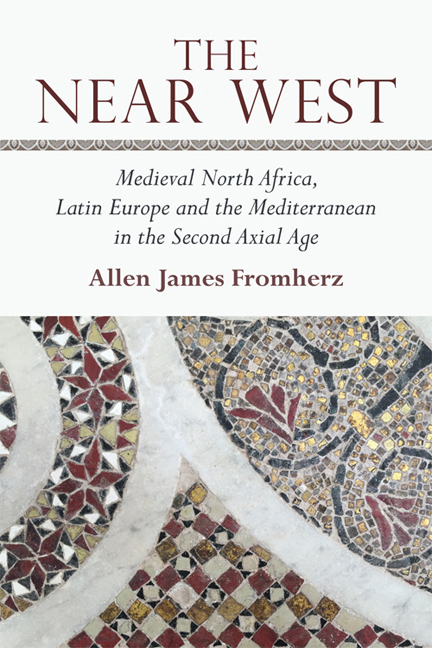Book contents
- Frontmatter
- Contents
- Map: The Near West – Medieval North Africa and Europe
- Personal Note and Acknowledgments
- Introduction: North Africa and the Mediterranean Paradox
- 1 Bèjaïa: Introducing North Africa, Latin Europe and the Mediterranean
- 2 Rome: North Africa and the Papacy
- 3 Tunis: Axis of the Middle Sea
- 4 Marrakech: The Founding of a City
- 5 The Almohads: Empire of the Western Mediterranean
- 6 Between City and Countryside: Ibn Khaldun and the Fourteenth Century
- 7 Conclusions: A Second Axial Age
- Notes
- Bibliography
- Index
4 - Marrakech: The Founding of a City
Published online by Cambridge University Press: 23 September 2017
- Frontmatter
- Contents
- Map: The Near West – Medieval North Africa and Europe
- Personal Note and Acknowledgments
- Introduction: North Africa and the Mediterranean Paradox
- 1 Bèjaïa: Introducing North Africa, Latin Europe and the Mediterranean
- 2 Rome: North Africa and the Papacy
- 3 Tunis: Axis of the Middle Sea
- 4 Marrakech: The Founding of a City
- 5 The Almohads: Empire of the Western Mediterranean
- 6 Between City and Countryside: Ibn Khaldun and the Fourteenth Century
- 7 Conclusions: A Second Axial Age
- Notes
- Bibliography
- Index
Summary
In 1091 a humbled prisoner in the town of Aghmat wrote a poem. Yet, this was not just any prisoner.
I say to my chains
don't you understand?
I have surrendered to you.
Why, then, have you no pity, no tenderness?
You drank my blood.
You ate my flesh.
Don't crush my bones.
My son Abu Hasim sees me fettered by you
And turns away his heart made sore.
Have pity on an innocent boy
Who never knew fear and must now come begging to you …
After a long and healthy reign, Mu‘tamid, King of Seville, and his family, a noble dynasty that had risen from rough warlords to cultured gardens of splendor and luxury, was captured, taken across the straits and hundreds of miles deep into Almoravid territory. The Almoravids reduced this poet king to prisoner at Aghmat, the old capital of the Almoravids located about half a day's journey from the new and growing city of Marrakech. It was here where this cultured king, enslaved by his own desperate act to save his kingdom, spoke “to his chains.” There was one child Mu‘tamid did not speak of in his lines: a daughter, named Saida, who had converted to Christianity and married Alfonso VI of Castile. According to a mix of legend and history, she brought with her a dowry gift, the fortified city of Cuenca, and bore Alfonso a son named Sancho.
From Seville to Marrakech
Returning in his mind to the splendid pleasure gardens of his Alcazar, he must have recalled often the golden colored city of Seville on the Guadalquivir River. Muslim trade and commerce in the Mediterranean was increasingly threatened by Christian ships including the Pisans and Genoese. One poet from Sicily, explaining the difficulty of traveling to Seville, wrote to Al-Mu‘tamid saying, “The Sea is of the Christians; vessels do not traverse it except at great risk; while the Arabs have the solid ground.” Yet despite some setbacks at sea, Seville was still a great port. Seville was a place of irresistible pleasures. Mu‘tamid assembled poets, epicureans and writers from around the Mediterranean, including the mercurial Ibn Hamdis, the itinerant poet who connected Mu‘tamid to Tunisia and the Zirid Berber court at Kairouan.
- Type
- Chapter
- Information
- The Near WestMedieval North Africa, Latin Europe and the Mediterranean in the Second Axial Age, pp. 119 - 144Publisher: Edinburgh University PressPrint publication year: 2016



